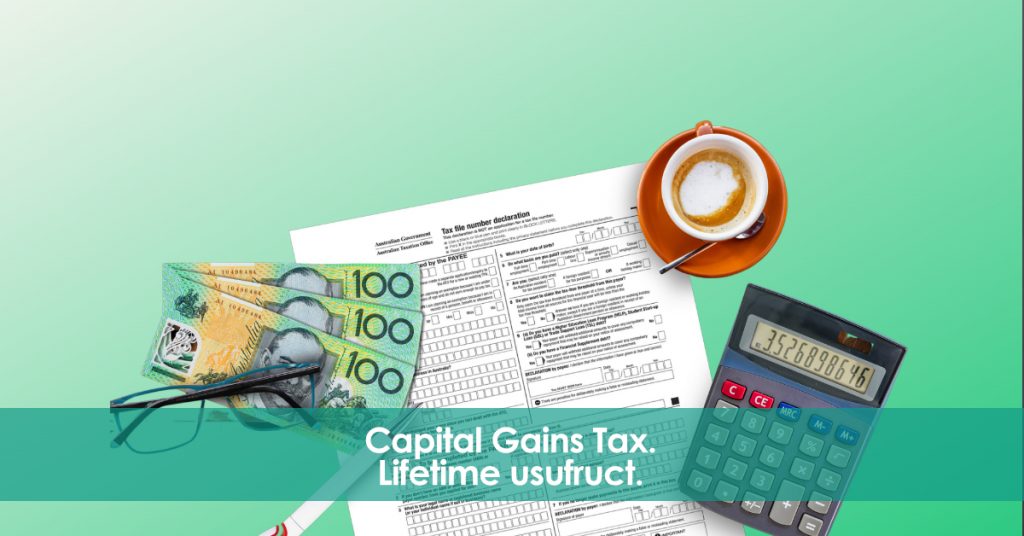As we have explained in several articles, capital gains tax is the main tax to be paid by the owners of a property in Spain when selling. It is calculated thought the difference between the acquisition value and the transfer value. In this week’s article we ask and respond, the following question: Is it possible that a property purchased for 100.000€ and sold for 175.000€, has a capital gains tax of almost 98.000€?. We analyse it below.
Capital gains tax: how exactly does it work?.
As we have just explained, the capital gains tax paid by the sellers is calculated by the difference between the transfer value and the acquisition value. Therefore, a property purchased for 100.000€ and sold for 175.000€ will generate a gain of “75.000€”. However, when there is a usufruct for life on the property, the calculation is not so simple and becomes more complicated.
Lifetime usufruct and bare ownership.
Usufruct and bare ownership are two sides of the same coin. In short, the usufructuary is the person who has the right to use and enjoy the property. And the bare owner is the one who holds the ownership of the property. This situation is very common in inheritances. When upon the death of one of the spouses, the children acquire the bare ownership of a property; and the widow is left with the lifetime usufruct. The “owners” are the children, but it is the mother who “enjoys” the use of the property.
How is the capital gain of the bare owner and the usufructuary taxed?.
When the property is divided between the bare owner and the usufructuary, the calculation of the capital gain is the same: transfer value – acquisition value. But there is a very important distinction: the value corresponding to the usufructuary, and to the bare owner must be individualised. Both in the acquisition and in the transfer. Let’s look at it.
How is the value of usufruct determined?.
First of all. The value of the usufruct can never be more than 70% or less than 10%. The simplest rule to calculate it is 89 minus the age of the usufructuary. Therefore, if the usufructuary is 50 years old at the time of purchase, the value of the usufruct will be 39% (89-50 = 39%). The rest, 61%, will correspond to the bare ownership. Continuing with the figures used at the beginning of the article. If the purchase price is 100.000€; the value of the usufruct will be 39.000€ and the value of the bare ownership 61.000€.
When the property is sold for 175.000€, the usufructuary is 79 years old. Therefore, the value of the usufruct is reduced to 10% (89-79). The opposite happens with the bare ownership: its value increases to 90%. In other words, the value of the usufruct in the sale is 17.500€ and the value of the bare ownership 157.500€.
Special rule: annual depreciation of 3% of the acquisition value of the usufructuary.
When the usufructuary has not received any income from the rental of the property, the acquisition value can be reduced by 3% for each year that has elapsed since its acquisition. In this case (usufruct of 19 years without any income) the acquisition value can be reduced by 22.230€ (39.000€ x 19 years x 3%). Therefore, the acquisition value for the calculation of the capital gains tax will be of 16.770€ (39.000€ – 22.230€).
Careful with the capital gains tax of the bare owner.
The result is undoubtedly eye catching. A property purchased for 100.000€ and sold for 175.000€, with the life usufruct detailed in this article, offers the following results. it would be a minimal capital gain for the usufructuary of 730€ (17.500€ – 16.770€). A bare owner with a capital gain of 96.500€ (157.500€ – 61.000€). Being the capital gain between them of almost 98.000€.
Conclusions.
In White-Baos Abogados we are experts in real estate law and tax advice related to sales and purchases, inheritances and donations, etc. If you are going to sell a property with a life usufruct, do not hesitate to contact us. We will study your case and offer you expert legal advice on the tax implications of the operation.
The information provided in this article is not intended to be legal advice, but merely conveys information relating to legal issues.
Carlos Baos (Lawyer)
White & Baos.
Tel: +34 966 426 185
E-mail: info@white-baos.com
White & Baos 2023 – All Rights Reserved.
